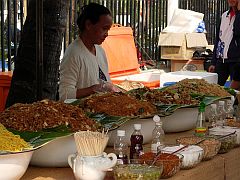 One of the joys of visiting Thailand is sampling the food. Thai people seem to have an obsession with food and it’s been said that if a Thai person isn’t actually eating then they will almost certainly be thinking about food. That may be an exaggeration but food does play an integral part in Thai life.
One of the joys of visiting Thailand is sampling the food. Thai people seem to have an obsession with food and it’s been said that if a Thai person isn’t actually eating then they will almost certainly be thinking about food. That may be an exaggeration but food does play an integral part in Thai life.
Visitors to Thailand will soon notice the abundance of hawker stalls selling all manner of weird and wonderful food. This is Thai style fast food and the hawker stalls have been in existence long before the advent of KFC and McDonald’s. Once you’ve got over the first concern about whether it is safe to eat from street stalls, you’re presented with the problem of communication. Most street vendors will not speak English but don’t let that worry you. If you see a hawker stall that looks interesting it won’t really matter if you can’t speak Thai and the vendor can’t speak English because a smile and a bit of polite pointing can work wonders. The vendor will probably speak to you in Thai as you smile back blankly. You can always try saying ‘mai khao jai’ (‘I don’t understand’) or ‘phut Thai mai dai’ (‘I can’t speak Thai’). If you remember to add ‘khap’ (if you are male) or ‘ka’ (if you are female) after the phrase it makes it very polite. This is always appreciated and if you pronounce it well will win you an instant new friend. Street vendors usually specialize in just one or two simple dishes and the price is minimal – often 10 to 20 Baht – so if you end up with something you don’t like you haven’t lost out financially. More importantly you’re making an effort and experiencing Thai life and eating where local people eat.
Some hawker stalls will have plastic tables and chairs where customers can sit down and eat. If there is no room or you don’t fancy sitting by the roadside to eat your food you can always order the food to take away by saying ‘sai tung’. This literally means ‘put into bag’ and you will see many people arriving by car or motorbike, ordering their food ‘sai tung’ and driving off a few minutes later with their take-away order neatly bundled into plastic bags. The vendor may place the food straight into plastic bags or they may use white disposable trays. Any spices, sauce or soup that accompanies your meal will also be placed into a separate mini-bag which is sealed with an elastic band. Just watching the vendor as they go about the whole process is an education in itself. Any food can be ordered ‘sai tung’ and so too can drinks. Coke, orange juice, iced-tea and iced-coffee are sometimes placed into disposable cups, but very often a plastic bag will be used. Crushed ice is scooped into a plastic bag and then the drink is poured in and with a few skilful twists, the vendor seals the bag and places a straw inside to enable you to drink as you walk along. Ingenious and delicious.
If you want to order an extra large portion of anything just ask for it ‘pii-set’ which means ‘special’. If you don’t ask for ‘pii-set’ you will automatically be given a normal or ordinary serving (‘thamadaa’). A ‘pii-set’ order will normally cost an extra 5 or 10 Baht and depending on the food which you’ve ordered may simply be a larger portion or include an additional item such as an egg.
photos © Thaizer